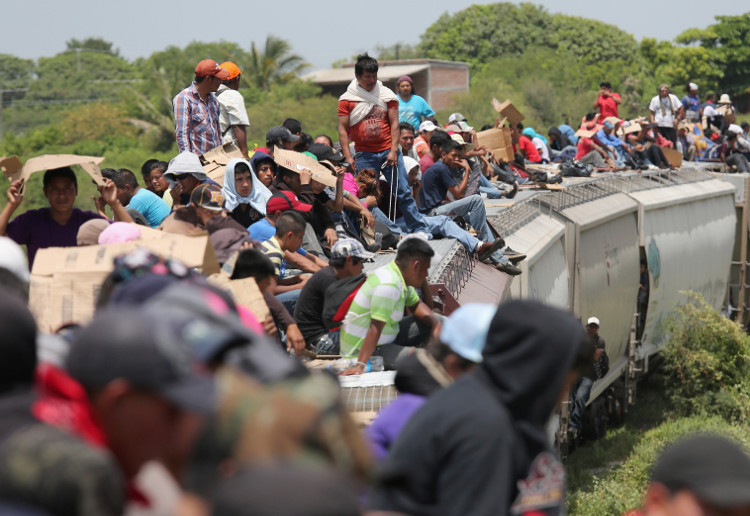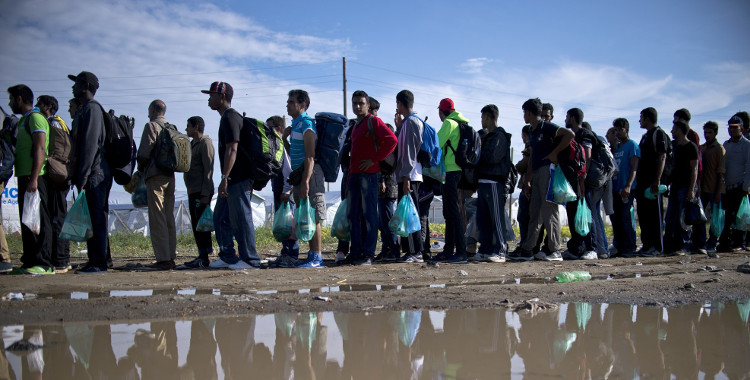Confessions of an International Development Worker | Me and My Western Privilege
Much has been written in Irish media of late relating to questions of privilege, intersectionality and call out culture. We had Frankie Gaffney’s opinion piece in The Irish Times, an open letter in response to this, the comments from left wing comrades signed by over 450 Irish, or Irish based feminists (myself included), the Twitter storm that followed, more responses in The Irish Times and, finally, a bizarre poem in which those same 450+ signatories were labelled as Capitalisms Handmaidens.
The #coponcomrades hashtag was trending on Irish twitter for at least a day and though there were many keen to dismiss our voices, many others were equally vocal in their support. While the back and forth was at times infuriating, it was heartening to see so many Irish feminists come together to support each other. It unmasked latent (and often not so latent) misogyny in Irish activist circles and it opened questions of intersectionality, privilege and oppression for a long overdue debate. One thing I felt that was largely missing from the debate on all sides was the question of Western privilege. What does it mean in this world, right now, to be a European citizen, regardless of your gender or class?
Before I go on, let me lay my western privilege cards on the table. I am a white, cis-gender, heterosexual, able bodied woman from a lower middle class family. I grew up (mostly) in a single parent household where my mother often went hungry because neither my father nor the Irish Courts understood the cost of raising three children. I finished secondary school, I worked my ass off in Penneys for a year and then set off on two year adventure around South America. I returned to Ireland to get a degree and eventually a masters, aided during those five years by a County Council grant.
After graduating I sold my soul for an nine month internship with the UN, where I quickly learned what international development worker privilege is. Though I was on the lowest wrung of the UN pecking order I still managed to convince myself that I couldn’t survive without a car, my weekly Balinese massage, Friday night cocktails and Gloria Jeans frappuccinos (there was no Starbucks). These indulgences were nothing compared to the luxuries expected by colleagues at the other end of the pecking order. Anyway, the UN machine eventually swallowed me, chewed me up and spit me back out, a little wiser and a lot more cynical. I landed in Guatemala where I have had a crash course in what privilege can mean where most people around you are living on the brink of survival.
Privilege, checked?
This is where my white, western privilege comes in, because one thing I feel eclipses all of my other intersections is the privilege of owning a European passport. It wasn’t until I left Ireland that I understood the significance of this.
Having worked and travelled across three continents (Europe, Asia and Latin America) I have rarely had to worry about obtaining a working or entry Visa. In the rare cases that I have had to apply for some kind of Visa it never occurred to me that I might be denied one. I know people who have lived in Guatemala for 15 years on a tourist Visa. Yes, it can be a pain in the ass the have to visit the migration office or cross the border every three months to renew that Visa, but the likelihood that anyone will stop you from traveling, prevent your yearly family visit to Europe, or deport you is pretty slim.
I live in a region where thousands of people use their savings, sell their land or take on huge loans to risk their health, wellbeing and their lives trying to reach the promised land of the USA. Few are foolish enough to still believe in the American Dream. They go in the knowledge that if they make it all that awaits them is hard slog, two, three or even four jobs as construction workers, fruit pickers or meat packing workers in conditions often resembling indentured labour.

They also go in the awareness that the road North is filled with peril: extortion, robbery, harassment and violence are par for the course. Arrest or imprisonment, another real possibility. Injury, death and disappearance the fate of many. They could fall off the Beast (the train that carries migrants through Mexico) from exhaustion and lose an arm or a leg. They might get lost or die of thirst in the desert. For women there are the added risks of rape (almost guaranteed) and trafficking or sexual slavery on the part of Mexico’s drug cartels.
Still, all of this may still feel preferable to staying in a situation of grinding poverty and escalating everyday violence. The majority of people in Central America live in a state of tremendous precarity. A serious illness can cost you your job, life savings and home because public health care is nonexistent and private health care bills start clocking the moment you walk through the revolving doors of the hospital. You can work twelve hours a day in a maquila factory for slave wages to produce branded clothing. Extortion, violence or death at the hands of criminal gangs are everyday occurrences. So why not risk the same if there is the hope of something better at the other end?
On the other hand, I have watched Guatemalan friends in less precarious circumstances sweat blood and tears trying to get a Visa to the US, Canada or Europe to be with their children and partners, who are citizens of those countries. In other cases I have seen parents separated from their children for 10 or 20 years because their Visa was never granted. Some are living illegally in the US and can never come home.
Fortress Europe
Meanwhile in North America plans move forward to build walls to keep those people out and in Europe the very existence of Schengen has come into question. The West becomes ever more determined to prevent supposed terrorists from entering and to exclude ever more of the ‘unwashed’ ‘uncivilised’ masses from its delicately maintained prosperity, all the time continuing our unrelenting economic exploitation of the Global South.
As Fortress Europe becomes an ever more tangible reality, few people have reflected on the fact that our delicately maintained wealth and privilege has been built on the back of 500 years of European colonial expansion, Western military intervention, war and unequal foreign trade relations. Many Europeans fail to make the connection that most of those refugees come from former colonies where war and resource extraction have wreaked devastation, destroyed the social fabric and created abysmal levels of poverty.
Yes but Ireland was also colonised, we suffered 700 years of brutal repression, famine and exploitation at the hands of the English, so we can’t possibly be held responsible for those injustices. Or so the story goes.
Nevertheless, in Ireland we have benefitted immensely from our proximity to and membership of the EU. Also we are white, meaning we have always had an easier time assimilating as migrants and seamlessly forming part of the EU. Our whiteness, our proximity to Europe and the fact that our natural resources are minimal are perhaps the only things that saved us from the fate of other European colonies such as the Democratic Republic of Congo or Guatemala.
Generation emigration
Furthermore, we are a nation of migrants – a legacy to the world that is at once celebrated and lamented. The massive flows of Irish migration paused briefly during the Celtic Tiger only to emerge again with force in the post 2008 economic crisis. This newest wave of migration, is markedly distinct to that lived by previous generations. It is more likely to be temporary, communication with home is eased through affordable flights and Skype and it is mostly young people in search of new experiences or opportunities.
Yet, scrolling through stories in The Irish Times Generation Emigration section one cannot help but catch the tone of adventure with a hint of nostalgia and a sprinkling of lament for another lost generations of young people. Few have reflected on the fact that Irish people travelling the world and migrating is a privilege shared by few across the world. Generation Emigration are economic migrants, seeking better opportunities, pay and work experience in the USA, Canada, Australia, New Zealand and Dubai. They are praised and congratulated for it. They are our ambassadors to the world of a modern, educated, skilled Ireland.
The irony is that all throughout the mid 90s and early 2000s, when for a brief moment in history the flow of migration was reversed and people actually started to come to Ireland in their drove, the term ‘economic migrant’ was a slur. It was used against principally non-white migrants, but also Eastern Europeans, who came to Ireland in search of better opportunities, as if this was the lowest form of migration. An Irishman in Nigeria is an ex-pat, while a Nigerian in Ireland is a migrant.

So given our history of colonisation and mass migration, where is our solidarity with the peoples of colonised nations? Did we leave it at the door when we gained independence and could blend in with the respectable whiteness of our European neighbours? From denying refuge to jews during World War II to having among the lowest levels of acceptance of refugees in Western Europe, Ireland’s migration and asylum policies continue exclude those who we deem unworthy to enter our shores.
I still have not quite managed to extricate myself from the world of international development because, in all honesty, there is not much else for a white westerner with a social conscience to do in Guatemala. I could teach English but I have no desire to contribute to that particular brand of neocolonialism. So I live among a myriad of daily personal and professional contradictions.
So these days I work on accepting the fact that we live in a world riddled with contradictions, that I am riddled with contradictions: as a white westerner I have tremendous privilege, but that I can also use that privilege to work towards a more just world. I dedicate my professional life to supporting the struggle for rights and justice in Guatemala.
In my personal life I use my body and my words, this space in HeadStuff and other publications, to talk about the issues that matter to me. From Ireland or Guatemala we can challenge the structures of global inequality and injustice, we can work to change unjust migration law and Ireland’s horrendous system of direct provision. Call me a social justice warrior or capitalist’s handmaiden if you want, I am still going to keep doing what I do, because it is better than looking the other way and doing nothing.
